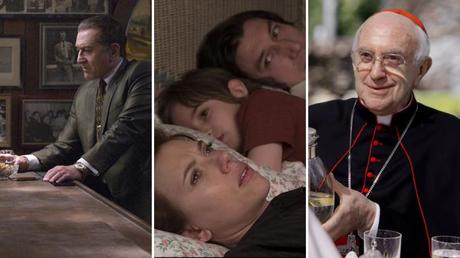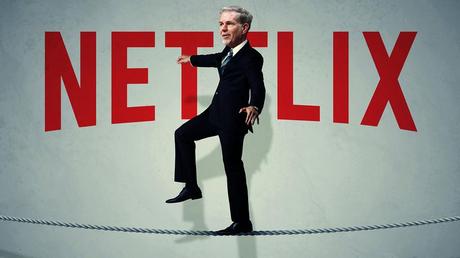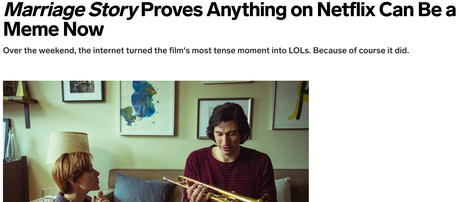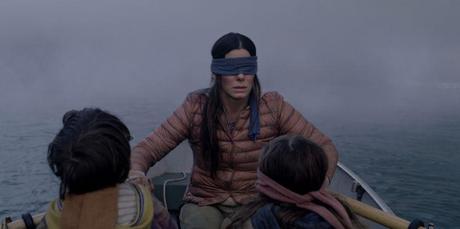
From right before Halloween right up to Christmas this year, Netflix attempted to dominate each weekend with yet another new movie, usually one fresh from a film festival and carried forward with serious Oscar buzz. That buzz didn't always translate - sorry, The Laundromat - but we are are now looking at a likely list of Best Picture nominees that will include three Netflix films - Marriage Story, The Irishman, The Two Popes - which were released in a four-week span at the end of the year. That's unprecedented. Oh, also, in-between Marriage Story and The Two Popes Netflix released a $150 million budget Michael Bay blockbuster.
No other studio in Hollywood history would ever even dream of such madness. Welcome to the future.

In Hollywood, there a lot of words to live by - no one knows anything, no one can gets first-dollar gross, never ask Tom Cruise about Scientology, never take a private hotel room meeting with a producer ever again, and for the love of the almighty dollar don't step over yourself.
That last bit is more common sense than some deep words of wisdom, really. It's basic business - when you are selling a product, you already have enough competition to worry about; you don't need to add yourself to that list. So, if you are a major movie studio with 10-20 new films to put out every year you don't schedule all of them to open on subsequent weekends in a two-month period. No, you space them out as evenly as possible and pick release dates according to historical comps.
If you are a biggie like Disney/Fox or Warner Bros., it might occasionally work out that you have several releases a month, but it's rare and almost always because your main film division has a blockbuster ready to go around the same time your specialty division has an awards contender. In such examples, you aren't cannibalizing yourself because the projects are going for very different audiences. Normally, though, you give each of your releases a couple of weeks to either win the day or not before you debut your next project.
For the majority of Hollywood history, or at least in my lifetime, that has been the strategy behind all movie releases, and it has stayed that way for so long because they are all operating under the same business model. It's a model where your best shot at maximizing profits is to grant each film its own release window, a process that kickstarts a set schedule leading to additional release windows for home video, cable, and streaming.

Netflix...yeah, they don't have to worry about any of that. Movie ticket sales, windowed releases? A Netflix executive cares not for such things.

No, Netflix wants to attract new subscribers globally and hold on to old subscribers, particularly in the States where the streaming giant has probably already reached max potential. It's biggest enemy is churn, and while AT&T and Comcast are busy turning legacy Hollywood studios in content farms/incentives to boost cable subscriptions and phone sales. Netflix is one of the last pure entertainment companies left. All it does is make and buy movies and TV shows and deliver them to subscribers, and those subscribers, Netflix hopes, will think twice about canceling if every single weekend seems to offer them something new worth watching.
That's how we ended up with an October-December release schedule that would give most Hollywood old-timers an ulcer:
- A new Stephen Soderberg movie (The Laundromat) starring Meryl Streep on Oct. 18.
- Eddie Murphy's comeback project (Dolemite is My Name) on Oct. 25.
- A clever update of Shakespeare's Henry V (The King) starring Timothy Chalamet on Nov. 1
- An Alicia Vikander thriller (Earthquake Bird) on Nov. 15, the same day as the streamer's first original animated film, the lovely hand-drawn throwback Klaus
- Scorsese's much-anticipated The Irishman on Nov. 27, followed two days later by Mati Diop's Cannes Festival Grand Prix winner and darkhorse Best Animated Film contender I Lost My Body
- Noah Baumbach's career-best Marriage Story on Dec. 6
- Michael Bay's completely unfiltered, positively insane, but highly meme-able Ryan Reynolds blockbuster 6 Underground on Dec. 13
- Film festival favorite and likely multi-Oscar nominee The Two Popes on Dec. 20
Perhaps we've all become so numb to Netflix's neverending content wheel that we no longer appreciate when the unprecedented happens, but what the streamer just pulled off is insane. Not all of it worked. The Laundromat and King remain largely unwatched and unexamined. Dolemite was popular for a weekend but is now something Murphy promotes on SNL two months after the fact just to get people to finally watch it. Some of it, like Atlantics and Klaus, took a couple of weeks to build momentum.
However, if you are a film fan with access to Twitter your past month has been built around people talking about The Irishman and Marriage Story. (See The Wired headline "Marriage Story Proves Anything on Netflix Can Be a Meme Now".) I don't have quite as good a read on what kind of impact 6 Underground or The Two Popes have had.

Not all of these films are going after the same people. I don't imagine the Venn Diagram of Marriage Story and 6 Underground features any overlap. Still, this is less a traditional release strategy, more like someone took a day of TIFF programming and stretched it out across subsequent weekends at the end of the year. No other studio would ever dream of doing that. The marketing costs would be astronomical and the chance of cannibalizing yourself too high.
Again, Netflix doesn't care. In fact, to say that no studio has ever done this before is bit of a fib because Netflix actually kind of tried this last year. It used subsequent weekends in November to debut high profile films The Other Side of the Wind (a finished version of Orson Welle's so-called lost masterpiece), The Outlaw King (a historical drama starring Chris Pine) and Ballad of Buster Scruggs (the Coens' western anthology). After taking a two-week break to focus on launching some TV shows around Thanksgiving, Netflix then made its closing argument in December with Mowgli: Legend of the Jungle (a big-budget studio picture sold off to Netflix), Roma (winner of many awards, just not Best Picture), and Bird Box (don't make me talk about Bird Box, please.)
The gambit didn't quite work. Mowgli barely moved the social media dial, Other Side was a for cinephiles-only kind of thing, Outlaw King ran up against tepid reviews, Ballad was regarded as a slight work in the Coens filmography, and Roma got all the way to the Oscar finish line but couldn't get into the endzone.

Bird Box was the hit no one saw coming (ironic given the premise, a dystopia where you beat the monster by not looking at it), but it further proved what many of this year's most successful Netflix films have managed - quality is ultimately secondary to meme potential. The streamer wants people to engage with its programming through memes and hot takes because then it feeds into social media word of mouth that always reminds people of the following: to be a part of the conversation, you need Netflix and certainly can't cancel if you already have it.
Of course, price increases, the streaming wars, and any number of other factors are working against Netflix. Ted Sarandos hopes taking home a Best Picture trophy will be another marketing coup, another way to convince people in new markets to subscribe and those of us in the States to stick around. Thanks to Marriage Story and The Irishman, there's a good chance he'll get what he wants, certainly more likely than last year when only Roma emerged as a contender.
Next year, however, I wonder if Netflix will do this again. Is an October-December strategy of one Oscar contender after another along with a stray blockbuster spread out every weekend their new thing? Or is it a max pressure Oscar strategy that goes away when Sarandos gets what he wants? Theater owners have to be hoping it's the latter. I suspect, however, this is the way things are going to be for the next couple of years. If the films are as interesting to talk about as the ones we got this year, well, that will always be something to be thankful for.

